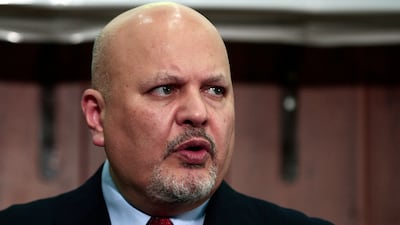Karim Khan, chief prosecutor of the International Criminal Court (ICC), is facing an investigation into allegations of misconduct reportedly involving a member of his office. He firmly denies the claims.
"I welcome the opportunity to engage in this process," Mr Khan said in a statement. "I will be continuing all other functions as prosecutor", while the investigation is ongoing, he added.
The ICC’s oversight body, the Assembly of States Parties, made the announcement after the court’s internal watchdog opened and shut an inquiry into the allegations after only five days.
“An external investigation is therefore being pursued in order to ensure a fully independent, impartial and fair process,” ASP president Paivi Kaukoranta said in a statement.
When sworn in as chief prosecutor of the ICC, the British lawyer, 54, said the court should be judged by its acts – "the proof of the pudding should be in the eating".
Mr Khan has shown he is not afraid to take on the world's most controversial cases, seeking arrest warrants for Israeli Prime Minister Benjamin Netanyahu, former defence minister Yoav Gallant and senior Hamas figures. The application followed an arrest warrant issued last year for Russian President Vladimir Putin, after which Moscow issued arrest warrants for Mr Khan.
Not afraid to take on controversy
But Mr Khan has faced down controversy throughout a career that has included stints defending Liberia's former president Charles Taylor against allegations of war crimes in Sierra Leone.
Other high-profile clients have included Kenya's President William Ruto in a crimes-against-humanity case at the ICC that was eventually dropped, and the son of late Libyan leader Muammar Qaddafi, Seif Al Islam.
Asked about "crossing the floor" – working as both prosecutor and defence – Mr Khan told publication OpinioJuris that it helps lawyers to stay "grounded". It also prevents "corrosive traits such as thinking that defence counsel is the devil incarnate or that as a prosecutor you are doing 'God's work'," he said.
Criticised initially for not acting fast enough to prevent atrocities in Gaza, Mr Khan sparked a firestorm when applying for arrest warrants over the war.
Mr Netanyahu called it a "moral outrage of historic proportions". For US President Joe Biden, it was "outrageous". Even before Mr Khan's application, senior Republicans wrote a letter threatening to bar Mr Khan and his family from the US, ending: "You have been warned."
But Mr Khan told CNN: "This is not a witch hunt. This is not some kind of emotional reaction to noise … it's a forensic process that is expected of us as international prosecutors."

Born in Scotland and educated at King's College
Born in Scotland, Mr Khan was educated at the private Silcoates School in northern England, before studying undergraduate law at King's College London.
His father was Pakistani, his mother British and he is a member of the minority Ahmadiyya Muslim sect, and sometimes sprinkles his speeches with "inshallah", or God willing.
Called to the bar in 1992, he started in international law at the former Yugoslav and Rwandan war crimes courts from 1997 to 2000.
Mr Khan later represented survivors and relatives of victims of the 1970s Khmer Rouge regime in Cambodia at its UN-backed court in the late 2000s.
His other roles have included a term at The Hague-based Special Tribunal for Lebanon, set up to bring to justice the killers of Lebanese former prime minister Rafic Hariri in 2005.
More recently, he led the UN special investigation into ISIS crimes and called for trials like those at Nuremberg of Nazi leaders.
A 'charismatic and articulate communicator'
Initially absent from a list of candidates for the top ICC prosecutor's job, Mr Khan was added reportedly at the insistence of the Kenyan government.
The ICC selection panel described him as a "charismatic and articulate communicator who is well aware of his achievements".
"I did apply because I thought I could do the role. If the search committee thought this was arrogance, then I'm guilty as charged," Mr Khan said.
Melanie O'Brien, visiting professor in international law at the University of Minnesota, told AFP: "From what I've observed, Karim Khan seems like a no-nonsense lawyer, which I quite respect,"
An ICC prosecutor "has to have a certain fortitude because you know that you are going to be up against people who don't agree with you and don't agree with the court generally", she added.


